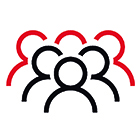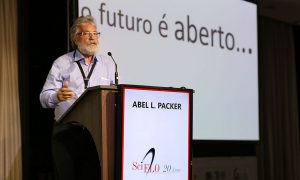By Abel L. Packer, Rogerio Meneghini, Alex Mendonça, Amanda Ramalho, Denise Peres, Luis G. Gomes, Gustavo Fonseca, Rondineli Gama Saad and Solange Santos
The SciELO 20 Years Week held on September 24 to 28, 2018, in São Paulo achieved the results we expected in terms of participation, reach and qualification of analyzes and debates around three main objectives. First, to celebrate the advances and achievements of the two decades of regular operation of the SciELO Program and the SciELO Network; second, to carry out a wide analysis and debate on the raison d’être and performance of the journals; and third, to address the challenges, perspectives and proposals for the future under the vision of a global and inclusive scholarly communication in which the journals and the SciELO Program have a proactive participation. The week comprised two days of the SciELO Network Meeting focusing on the present and future of SciELO journals and three days of the SciELO 20 Years Conference focused on the state of the art of scholarly communication. The outcomes acquired importance and historical dimension with the formalization of the new stage of development of the SciELO Program in alignment with the open science modus operandi. This alignment that has been analyzed and discussed in recent years was systematized in the priority lines of action for the years 2019-20231.
From the perspective of the positioning and contribution of SciELO to the construction of a global and inclusive scholarly communication that surpasses the divisions between leading and regional journals or the global division between north and south, the SciELO 20 Years Week was conceived and carried out as a public forum of analysis and debate, having as a reference the state of the art of scholarly communication that is experiencing one of the greatest transformation periods of its entire history with the emergence of open science. In this context, one of the most difficult transformations in the international research communication ecosystem is the universalization of open access to scientific literature, a goal that was adopted 20 years ago by the SciELO project, which has placed Brazil and other SciELO Network countries as pioneers of the Open Access movement. However, open science extends the demand for open access beyond articles and encompasses all dimensions of research, which makes the insertion of journals highly challenging as it requires, along with other instances, to advance a renewed approach to functions, policies and operation of journals. SciELO journals and their research communities see the concept of openness as an inherent practice of communicating research results, which will favor the transition to open science.
The SciELO Brazil team responsible for organizing the SciELO 20 Years Week had the decisive support of experts from Brazil, of SciELO Network countries and other countries2,3. The working groups on the journals and the SciELO Network and the discussion groups on the themes of the panels of the International Conference relied on leaders who freely developed their topics. The results regarding the participation and appropriation of the approach and purposes of the forum were very satisfactory. The group of events and activities had more than 700 participants among authorities, researchers and scientific information professionals, of which 127 had active participation in discussion groups, working groups, panels and workshops, of which 48% had foreign affiliation. The organization was also supported by numerous institutions, including Fundação Oswaldo Cruz, Google Scholar, Canada’s International Development Research Centre (IDRC), UNESCO, and the UK’s Wellcome, as well as 49 other organizations related to scholarly communication and to SciELO participated in the financial support network under the “Friends of SciELO” banner.
Having as reference the priorities of the SciELO Program for the improvement of journals in terms of professionalization, internationalization and operational and financial sustainability, the program of the SciELO 20 Years Week converged the concerns, interests and national priorities of Brazil and other SciELO Network countries with the main advances and innovations that are occurring in the most advanced centers. This approach follows SciELO’s policy of balancing the interests and priorities of national research and nationally edited journals with the active participation in the international flow of scholarly communication. Besides ensuring the participation of all stakeholders and related movements, we achieved fair representation in terms of themes, gender and, within budgetary constraints, geographical areas.
Based on the framework presented above, the Week’s program has interwoven two main movements whose confluence of ideas, policies, methodologies and technologies will contribute to qualify the future development of SciELO journals. First, the strengthening and recognition of journals for their historical, social, and academic relevance in creating and sustaining research communities and disciplines, advancing research and education attuned to local priorities and conditions without losing the international character of science, and as sources of information and scientific evidences to support public policies and informed decisions of professionals and citizens. This first movement also includes journals not indexed in SciELO but with the same centrality that project their insertion in the ongoing innovation processes. The second movement comprises the processes of innovation towards the open science modus operandi in favor of the celerity and transparency of the research processes and their communication, of the sharing and reuse of the articles’ contents, emphasizing the data and software codes underlying the articles’ texts and with the main objective of maximizing the reproducibility of research results (Chart 1).
| Dimension | Level of openness | |
| Initial | Advanced | |
| Celerity in communication | Preprints as manuscripts | |
| Continuous publication | ||
| Provisional articles (unedited articles) | ||
| Referencing of data and software codes underlying the articles | Article indicates whether data are available and how to obtain them | Data should be deposited in a trusted repository |
| Open peer review | Disclose the name of the editor responsible for following the article during the assessment process | Share the identity of authors and peer reviewers during the assessment process |
| Publishing peer review reports | ||
| Open peer review process | ||
Chart 1. Open science: Update of the journals’ editorial policy – Instructions to authors
All the contents generated and gathered in the different activities of the SciELO Network Meeting (Chart 2) and the SciELO 20 Years Conference (Chart 3), such as the texts, the comments, the 90 slide shows, the 40 hours of audio, the 24 hours of video or the 390 photos are available on the event’s website – <www.scielo20.org>, composing a contemporary collection on current and future dynamics of research communication.
| September 24 Monday |
September 25 Tuesday |
| Working Groups | Recommended editorial practices and transition into Open Science |
| XML – Why and how: JATS | |
| Network digital preservation | |
| WG1 – Yesterday, today and tomorrow of SciELO Network | ORCID – Adoption at national level: The case of Brazil |
| WG2 – The historical, academic and social relevance of SciELO journals | DOI – Functions and options of adoptions at nacional level: the case of Brazil |
| WG3 – Relevance of Public Health Journals in informing research, education, health services and citizenship | DOAJ – Principles of transparency and best practices in scholarly publishing |
| WG4 – Performance of SciELO journals | Academic Social Media for journals: Increasing reach |
| WG5 – Scientific Publishing Innovations and the Future of Peer Review and Journals | What’s new in PKP? |
| WG6 – Workshop on the use of data from the SciELO database | Recommended Editorial Practices & ScholarOne Manuscripts |
| WG7 – Institutional journal portals and the transition to open science | SciELO 2019-2023: Policies and indexing criteria of the national collections and editorial policies that pave the journals’ transition into open science |
| WG8 – Relevance of Academic Books in Research Communication | Working Groups reports |
Chart 2. Program of the SciELO Network Meeting
Chart 3. Program of the SciELO 20 Years Conference
There is much to analyze, study, criticize and systematize from different perspectives, such as research managers, researchers, journal editors, information professionals and those responsible for scientific information and communication products and services. The 20th Anniversary celebration of SciELO was brightened with generous messages from notorious scientists (Chart 4), journal editors and open access leaders, including Professors Harold Varmus of Cornell University and 1989 Nobel Prize Laureate in Physiology or Medicine, former director of the National Institute of Health (NIH) and co-founder of the Public Library of Science (PLoS); John Willinsky of the Stanford University and Director of the Public Knowledge Project (PKP), responsible for Open Journal System (OJS); Jean Claude Guédon of the University of Montreal and Coordinator of the Expert Group on the future of Scientific Publishing of the European Commission; and Robert-Jan Smits, Senior Advisor on Open Access and Innovation at the European Political Strategy Centre (EPSC) of the European Commission and leader of Plan-S conducted by the consortium cOAlition S involving the European Research Council and the main European research funding agencies.
 |
 |
 |
 |
 |
| Harold Varmus | John Willinsky | Jean Claude Guédon | Robert-Jan Smits | Testimonies |
| Professor, Cornell University | Professor, Stanford University Director, PKP |
Professor, University of Montreal | Senior Adviser on OA and Innovation, EPSC |
Chart 4. Messages and testimonies
Among the concerns that have permeated most of the events’ participants, but especially the editors and editorial team professionals, are, on the one hand, the immediate, medium and long-term implications of the open science modus operandi on the functions, policies and editorial management of journals and, on the other hand, how will the journals create the conditions to become progressively proactive agents of open science. In other words, journals occupy the condition of both being led and of leading the open science movement. Thus, while they occupy an essential position in research communication, they are not alone aligning with open science. The advancement of open science is driven by policies, programs and actions at the international and national levels and the main actors are research funding agencies, data management platforms, preprints repositories, journals and, of course, researchers. Journals will live among a myriad of supporting and complementary instances to their classic functions. However, the role of journals validating research through editorial processes, peer review and improvement of texts remains essential.
In the case of nationally edited journals in Brazil and in the SciELO Network countries, alignment with open science becomes a priority in the near future, which requires the updating of editorial policies and, as a consequence, of editorial management and operation. It is a process that will acquire its own dynamics in the different disciplines and thematic areas. An important aspect is that, although it represents an international alignment of journals, the adoption of best practices of open science will contribute to the improvement, transparency, efficiency and impact of research focusing on local, national and regional problems, interests and uses.
Another crucial aspect concerns the performance of journals and the research they publish. In the SciELO model, the performance includes compliance to best practices of scientific communication, the journal’s historical, social and academic relevance, its performance according to metrics of received citation, and the web presence measured by altmetrics from different bibliometric indices. An important innovation in the journals’ evaluation process, introduced by FAPESP during the SciELO 20 Years celebration, is the Editorial Development Plan (EDP), which describes the results sought for the next three years in terms of sustainability, contribution to the thematic area and bibliometric indicators, based on the institutional conditions, relevance and specificity for the thematic area, compliance with best editorial practices, and performance in terms of indexing and metrics.
Most journals are expected to be aligned with open science practices within the next three years. The accomplishment of this scenario will position the SciELO journals and the research they communicate simultaneously with the international research and reference journals in their respective thematic areas.
Notes
1. SCIENTIFIC ELECTRONIC LIBRARY ONLINE. SciELO – Priority lines of action 2019-2023 [online]. SciELO 20 Years. 2018 [viewed 19 December 2018]. Available from: https://www.scielo20.org/redescielo/wp-content/uploads/sites/2/2018/09/Líneas-prioritaris-de-acción-2019-2023_en.pdf
2. SciELO Network Meeting – Organizing Committee <https://www.scielo20.org/redescielo/en/#organizing-committee>
3. SciELO 20 Years Conference – Organizing Committee <https://www.scielo20.org/en/#organizing-committee>
References
SCIENTIFIC ELECTRONIC LIBRARY ONLINE. SciELO – Priority lines of action 2019-2023 [online]. SciELO 20 Years. 2018 [viewed 19 December 2018]. Available from: https://www.scielo20.org/redescielo/wp-content/uploads/sites/2/2018/09/Líneas-prioritaris-de-acción-2019-2023_en.pdf
External links
SciELO 20 Years <https://www.scielo20.org/en/>
SciELO 20 Years Conference – Organizing Committee <https://www.scielo20.org/en/#organizing-committee>
SciELO Network Meeting – Organizing Committee <https://www.scielo20.org/redescielo/en/#organizing-committee>
SciELO Network Meeting <https://www.scielo20.org/redescielo/en/>
Translated from the original in Portuguese by Lilian Nassi-Calò.
Como citar este post [ISO 690/2010]:

















Read the comment in Spanish by Juan A.:
https://blog.scielo.org/es/2018/12/19/scielo-post-20-anos-el-futuro-sigue-abierto/#comment-42540